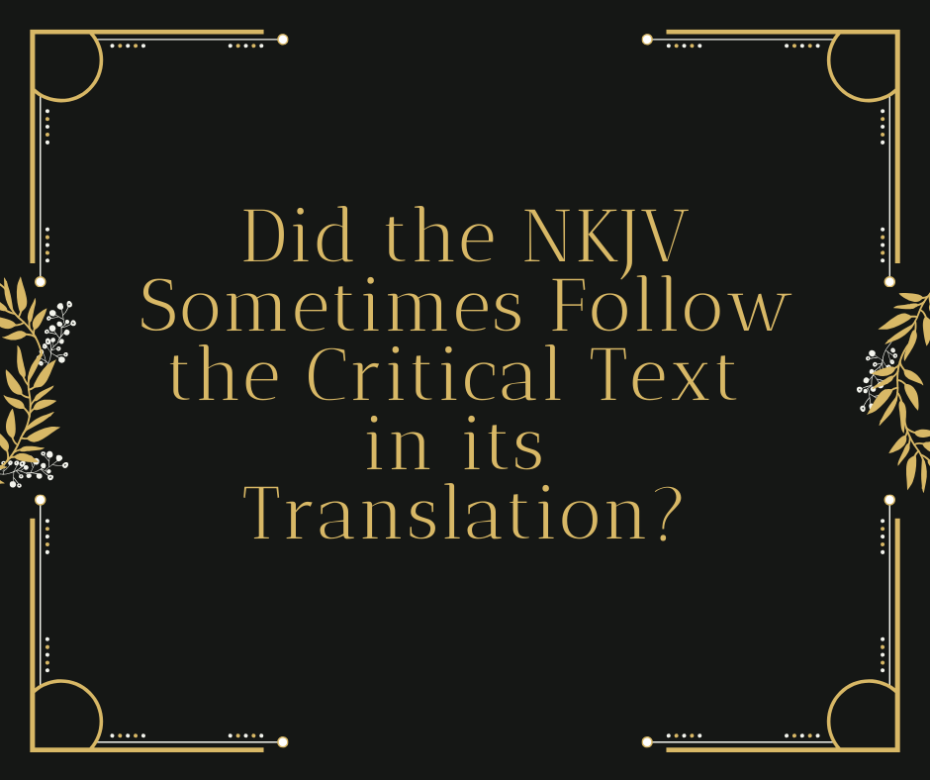Recently I wrote a blog about the claim that the King James Version used today is “inspired, inerrant, and infallible.” I showed that the reasoning behind this claim is flawed. I suggested that the NKJV is based on the same manuscripts and is simply an updating of the English. The NKJV is essentially a translation of the KJV.
By writing that blog, I opened myself up to questions about differences between the KJV and NJKV translations.
One reader wrote: “Please compare each verse in the NKJV to the KJV. In many verses the NKJV follows the Alexandrian text. Also, In 1 Corinthians 1:21 the NKJV says that the gospel MESSAGE ITSELF is foolish (as does all the versions based on the Alexandrian texts) instead of what God says in the KJV, that the METHOD OF PREACHING to save is foolish. In 1 Corinthians 1:18 God says that the preaching of the cross (the message) is foolishness to them that perish. I would not read or trust in a Bible version that says the message of the cross is foolish. God bless you and your ministry.”
The issue in 1 Cor 1:21 is not what Greek word is being translated. The Critical Text (CT), which the reader calls the Alexandrian text, since the CT manuscripts primarily came out of North Africa, has the same reading as the MT and the TR. They all read dia tēs mōrias tou kērugmatos. That can legitimately be translated “through the foolishness of the preaching” (KJV, Darby, MEV, LEB, NET, YLT, WEB, CEB, WYC) or “through the foolishness of the message preached” (NKJV, HCSB, NASB, RSV, NIV, ESV). The ESV reads, “through the folly of what we preach,” but it has a note which reads, “or the following of preaching.” The NASB has a note saying, “Literally, preaching.”
The LEB, NET, and CEB translations, based on the CT, read “through the foolishness of preaching.” Many translations based on the Alexandrian manuscripts have the same reading as the KJV, contrary to the impression the reader had.
The point of 1 Cor 1:21, regardless of which translation you choose, is that the unbelieving world considers the preaching of the cross to be foolishness. The reader does quote 1 Cor 1:18 which says in the KJV and NKJV, “the preaching of the cross is to them what perish foolishness.” The preaching of the cross is a message, not a “method of preaching” as the reader suggests. Indeed, the reader says concerning 1 Cor 1:18, “the preaching of the cross (the message) is foolishness to them that perish.” The message, not the method of preaching, is what is seen as foolishness by the unbelieving world.
The reader says as well, “In many verses the NKJV follows the Alexandrian text.” That is not correct. Even when the NKJV editors knew that the MT disagreed with the TR, they printed the TR reading. See, for example, John 1:28; Acts 15:11; 1 Peter 3:20; 1 John 1:4; 5:7b-8; Rev 22:19 and the footnotes concerning those verses in the NKJV.
What the reader may mean is that Bible translations which rely on the CT sometimes will translate a given word or phrase in the same way that the NKJV, but not the KJV translators, did. That is true as evidenced in 1 Cor 1:21. However, the reason this happens at times is because translation is not one for one. The underlying Greek words can be translated in different ways. We might argue which way is best. But the NKJV never follows the Alexandrian text. It follows the TR, as it was designed to do.


